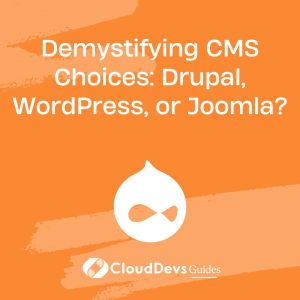Demystifying CMS Choices: Drupal, WordPress, or Joomla?
In the digital age, having an effective online presence is crucial for businesses and individuals alike. Content Management Systems (CMS) have revolutionized the way websites are built and maintained, offering a user-friendly interface and powerful features. Drupal, a popular open-source CMS, is often compared to other CMS platforms like WordPress and Joomla. In this article, we will explore the strengths and weaknesses of Drupal when compared to these alternatives, helping you make an informed decision for your website project.
Drupal: A Brief Overview
Drupal is an open-source CMS known for its flexibility, scalability, and robustness. It is favored by developers for its extensive customization capabilities and the ability to handle complex websites. Drupal is often chosen for large enterprise-level projects, government websites, and community-driven platforms. Let’s dive into a detailed comparison between Drupal and other CMS platforms:
1. Drupal vs. WordPress
Strengths of Drupal:
– Scalability: Drupal excels in handling large and complex websites with high traffic. It can handle thousands of pages, users, and content types without a significant performance drop.
– Security: Drupal is renowned for its security features and regular updates. It has a dedicated security team that actively monitors vulnerabilities and releases patches quickly.
– Customization: Drupal offers extensive customization options, making it a developer’s paradise. It allows you to create highly tailored and unique websites.
Weaknesses of Drupal:
– Learning Curve: Drupal has a steeper learning curve compared to WordPress. It may not be the best choice for beginners or small businesses with limited resources.
– Plugin Ecosystem: While Drupal has a wide range of modules, it can’t match the sheer number of plugins available for WordPress. Finding specific features may require custom development.
WordPress:
WordPress is the most popular CMS globally, powering nearly 40% of all websites. It’s known for its simplicity, ease of use, and a vast ecosystem of plugins and themes. WordPress is an excellent choice for bloggers, small businesses, and non-technical users.
When to Choose WordPress:
– If you are a beginner or have limited technical knowledge.
– For smaller websites or personal blogs.
– When you need quick development and a wide range of available plugins and themes.
2. Drupal vs. Joomla
Strengths of Drupal:
– Flexibility: Drupal offers more flexibility and advanced content management features compared to Joomla. It’s better suited for complex websites and applications.
– Community and Support: Drupal has a vibrant community and a wealth of documentation and resources for users and developers.
– Multilingual Support: Drupal excels in multilingual capabilities, making it an excellent choice for global or multi-regional websites.
Weaknesses of Drupal:
– Complexity: Similar to Joomla, Drupal has a steeper learning curve compared to WordPress. Building a website may require more technical expertise.
– Smaller Market Share: Drupal has a smaller market share compared to WordPress, which can affect the availability of themes and third-party integrations.
Joomla:
Joomla is another open-source CMS that falls between Drupal and WordPress in terms of complexity. It offers a middle-ground solution for users who need more power and flexibility than WordPress but find Drupal too overwhelming.
When to Choose Joomla:
– For medium-sized websites with more complexity than what WordPress can handle.
– If you value a balance between flexibility and user-friendliness.
– When you need strong user and access control features.
3. Drupal vs. Other CMS Options
While WordPress and Joomla are two of the most well-known alternatives to Drupal, there are other CMS options worth considering, depending on your specific requirements:
3.1. Magento:
– E-commerce: If your primary focus is e-commerce, Magento is a top choice. It’s designed specifically for online stores and offers robust e-commerce features.
3.2. Shopify:
– Simplified E-commerce: Shopify is a user-friendly platform that specializes in e-commerce. It’s ideal for small to medium-sized online stores.
3.3. TYPO3:
– Enterprise-Level CMS: TYPO3 is another CMS designed for enterprise-level websites. It offers scalability, multilingual support, and extensive customization.
3.4. Wix:
– Drag-and-Drop Builder: Wix is perfect for beginners and those who need a quick and easy way to create a website. It’s a fully hosted platform with a user-friendly interface.
Conclusion
Choosing the right CMS for your website project is a critical decision. Drupal, WordPress, Joomla, and other CMS options all have their unique strengths and weaknesses. Your choice should align with your project’s specific requirements, your technical expertise, and your long-term goals.
– Choose Drupal if you need a highly flexible and scalable platform, especially for complex websites or applications.
– Opt for WordPress if you’re a beginner, need a simple and user-friendly CMS, and want access to a vast plugin and theme ecosystem.
– Consider Joomla if you’re looking for a middle-ground solution with more power than WordPress but not as complex as Drupal.
– Explore other CMS options like Magento, Shopify, TYPO3, or Wix if your project has specialized needs beyond traditional content management.
Ultimately, the right CMS will empower you to create and maintain a website that meets your goals and resonates with your audience, ensuring a successful online presence.
Table of Contents







